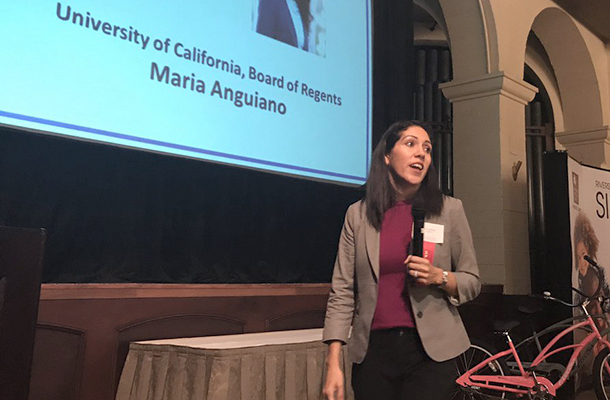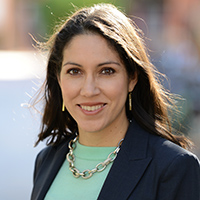
(Photo courtesy of Maria Anguiano)
Maria Anguiano is the chief financial officer at the Minerva Project, a member of the University of California Board of Regents, and a former UC Riverside vice chancellor. We asked Anguiano about her own story and her drive to reform higher education, as part of our Elevate CA discussion on how to improve upward mobility for millions of Californians.
There are moments in all of our lives when we find ourselves at a crossroads – when decisions we make will have a huge impact. Sometimes, we realize the significance of the moment and the decision. But most of the time we don’t and only years later do we realize their importance.
Maria Anguiano remembers many such moments in her professional life but one she made while still a schoolgirl put her on a path to accomplishment that includes becoming the youngest University of California vice chancellor, a recent appointment to the powerful UC Board of Regents and perhaps more importantly, has fueled a passion to take on the monumental commitment to reform higher education in California.
Not bad for a self-described “nerd” raised by an immigrant single mother.
Maria recounted the daily trip she used to make from the home she shared with her mother, brother and sister in Tijuana across the border to her elementary school just south of San Diego. Although born in Southern California, financial hardship dictated a family move to Mexico. But her mother – believing strongly in education – insisted her children continue their schooling in the U.S.
“We’d wake up around five in the morning to get to our school which was in National City which is about ten miles from the Mexican border. It was so hard just to get to school every day that it made no sense for me not to focus on my studies.”
It was the first of many seemingly small but significant choices Maria made that would come to define, not only her professional success, but also instill in her a clear understanding and appreciation for what has become almost a cliché regarding education – the power it has to transform lives.
“For me, higher education opened the door to a world of possibilities I didn't know existed,” she said. “Our young people today deserve the opportunity to pursue their dreams as well and not be shut out because of cost or lack of access.”
Anguiano’s ascent to success is as impressive as it was rapid. After her graduation from Claremont McKenna College, she used her degree in economics and accounting to land a job with Deloitte & Touche in corporate and nonprofit auditing and financial statement analysis.
“I always loved math and numbers. I was always interested in being the person in charge of money. So, in 7th and 8th grade I was the class treasurer. I’ve been responsible for finances since I was 13!”
But after a couple of years at Deloitte, Maria reached another crossroads. As challenging as the job was she knew she had not yet found her place in the world.
A lunch conversation with the son of a former professor changed all that.
“I had never heard of a business school before. He explained what I had to do, how you work for a few years then apply. That one conversation opened up my eyes to what was possible and sometime that’s all people need.”
She was accepted into Stanford’s Graduate School of Business and that lead to a job with Barclays Capital in public finance investment banking.
Then, another crossroads. At the age of 34 she became the youngest vice chancellor in UC history. She remembers the decision to pursue the position – essentially she would become the University of California Riverside’s chief financial officer. Some told her she was too young or that she didn’t have enough experience. But despite the obstacles she persisted.
“It was the luckiest break in my life. I finally had the chance to put my two passions together; education and my finance skills.
She is proud of what she accomplished during her three years at UCR – an experience she says prepared her for her current position as the CFO for the Minerva Project and her next ambitious goal – to reform higher education. Maria says her whole life had essentially prepared her for this seemingly impossible task.
“I see three problems in higher education that we have to fix as a society in order to move on. First, it costs too much. That sticker shock is very real and prevents many from even applying.”
The second problem, she says, is the value of the education itself. “There’s so much talk about degree completion and not enough talk about what are they getting with that degree? We don’t just need a bunch of degree holders. We need highly educated people with skills to thrive in the 21st century.”
The third problem Maria points to is college curriculum. Critical thinking and other important education goals come as a byproduct of college curriculum, not as the focus.
“And that’s what Minerva is all about. They’ve figured out a way to use technology to reduce the cost, instill active learning, which is super engaging for students, and the curriculum is based on practical knowledge.”
Whether through education policy reform, through continued efforts at Minerva, or even by starting a new university, Maria says her ambition is simple.
 “I want to create a high-quality, low-cost education. I don’t think those two things are mutually exclusive. If you think of the innovation in the last 20 years, we can figure out how to create pocket size computers, gene-editing technology, self-driving cars, and reduce the cost of producing all of those things to a fraction of their original cost. Why can’t we do the same thing with education?”
“I want to create a high-quality, low-cost education. I don’t think those two things are mutually exclusive. If you think of the innovation in the last 20 years, we can figure out how to create pocket size computers, gene-editing technology, self-driving cars, and reduce the cost of producing all of those things to a fraction of their original cost. Why can’t we do the same thing with education?”
Maria says we might just be at the crossroads to make that possible.
Elevate CA is a discussion of how to address the expansion of the middle class in California. There are 18 million Californians who live in or near poverty, a topic that will be featured at the California Economic Summit on November 2-3 in San Diego.

